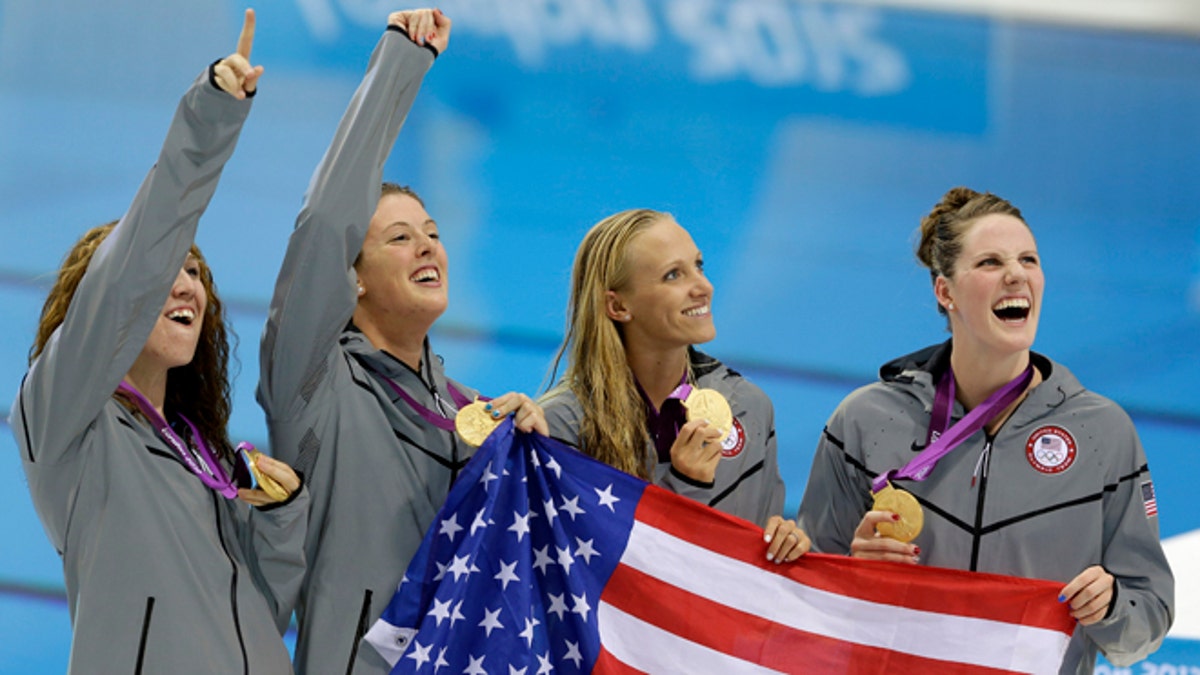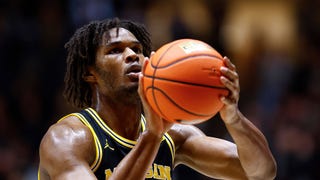
Aug. 1, 2012: From right, United States' Missy Franklin, United States' Dana Vollmer, United States' Allison Schmitt and United States' Shannon Vreeland pose with their gold medals for the women's 4x200-meter freestyle relay swimming final at the Aquatics Centre in the Olympic Park during the 2012 Summer Olympics in London. (AP)
LONDON – Nathan Adrian took out the Missile by a fingertip. Then Allison Schmitt dealt more heartache to the team from Down Under.
Adrian, a 23-year-old largely overshadowed by American stars such as Michael Phelps and Ryan Lochte, made a name for himself by winning the 100-meter Olympic freestyle Wednesday. He lunged to the wall to edge James "The Missile" Magnussen by one-hundredth of a second — the slightest margin possible — and again deny Australia its first individual swimming gold of the London Games.
Adrian pounded the water, then put his hands over his eyes while dangling over the lane rope, as if he couldn't believe the "1'' beside his name. Magnussen hung at the end of the pool, staring straight ahead at the wall in disbelief, the wall he got to just a fraction of a second too late.
"It's not who swims the fastest time this year," said Adrian, a not-so-subtle dig at Magnussen posting the best time ever in a textile suit back in March. "It's who can get their hands on the wall first here tonight."
The Aussies took another bitter defeat in the final event of the evening, again to their American rivals as Schmitt chased down Alicia Coutts for gold in the 4x200 freestyle relay.
Schmitt dived in the water about a half-second behind but passed Coutts on their first return lap and won going away in 7 minutes, 42.92 seconds. The Australians settled for another silver in 7:44.41, while France took the bronze.
Schmitt is turning into one of the biggest American stars of the games, picking up her second gold to go along with a silver and a bronze. Seventeen-year-old Missy Franklin also claimed her second gold swimming the leadoff leg, and Dana Vollmer now has two golds in London. Shannon Vreeland rounded out the gold medal-winning quartet.
Like the Aussies, the record book also took quite a beating.
Daniel Gyurta and Rebecca Soni both set world records in the 200 breaststroke. The Hungarian won gold, while Soni set her mark in a semifinal heat, further proof that its still possible to go fast — really fast — even without the now-banned bodysuits. Five records have fallen over the first five days at the Olympic Aquatics Centre, defying those who felt it would take years, maybe even decades, to take down some of the marks set with technological assistance.
"If I feel good, I don't want to hold back. I shouldn't," Soni said. "I just went for the last 50 and I started to hear the crowd halfway through and just kept going with it.
"It's been four years since I swam close to that fast, so it's great to be back on top like that."
Adrian was on top of the world after touching in 47.52, giving the U.S. its first title in swimming's signature event since Matt Biondi at the 1988 Seoul Olympics. Canada's Brent Hayden took silver in 47.80, his country's first medal ever in the furious down-and-back sprint.
"We were in the ready room and we watched it and just went nuts," Lochte said. "We were screaming and everything. That was one of the greatest finishes. We're so happy for him."
Adrian watched Soni's record on television while chatting with reporters in the mixed zone.
"Whoa, Rebecca just set a world record," he said. "I'm overshadowed by Rebecca setting a world record."
He should be used to that by now, swimming for a team that includes Phelps and Lochte. But Adrian gave a glimpse of his potential in the 4x100 free relay, going faster than Magnussen on the opening leg, a shocker given that the Missile had looked unbeatable at last year's worlds and went a stunning 47.10 at his country's national trials.
Unfortunately for the Aussies, Magnussen hasn't been at his best when it really mattered, and these Olympics are turning into a downright bummer for the swimmers from Down Under.
"I just felt pretty much bulletproof coming into this Olympics," Magnussen said. "It is very humbling."
Australia, which normally battles with the Americans for pool supremacy, has eight medals but its only gold came in the women's 4x100 free relay. The Americans are pulling away in the medal table with eight golds and 18 medals overall.
"I have a lot more respect for guys like Michael Phelps who can come to the Olympics and back it up under that pressure," Magnussen said. "It is a pretty tough time to learn you are human."
The Americans are feeling good about themselves, producing more of a team effort after Phelps dominated the last two Olympics.
"We've had a great week so far," Phelps said. "We are just starting to pick up more and more steam, so hopefully we can finish it."
Gyurta needed every bit of speed in his race to finish off Michael Jamieson, who made a furious bid for Britain's first gold at the pool. The Hungarian touched in 2:07.28, shaving 0.03 off the previous mark set by Christian Sprenger of Australia at the 2009 world championships in a suit that is no longer allowed.
Soni showed plenty of speed, too, and it wasn't even for a medal. She touched in 2:20.00 to break yet another of the bodysuit records, a time of 2:20.12 set by Canada's Annamay Pierse at the '09 worlds.
Jiao Liuyang of China set an Olympic record to win the women's 200 butterfly. She was second at the final turn but sprinted into the lead to touch in 2:04.06 seconds, 0.12 quicker than countrywoman Liu Zige's time at the 2008 Beijing Games. Mireia Belmonte Garcia of Spain took silver in 2:05.25 and Natsumi Hoshi of Japan finished in 2:05.48 to take bronze.
Gyurta trailed two-time defending Olympic champion Kosuke Kitajima midway through the men's breaststroke, but seized control on the third leg as the Japanese star began to fade. Making the final turn, Gyurta seemed to be in control.
Then, as he popped up and down in the water, heading for home, Gyurta suddenly felt Jamieson surging up on his right shoulder. The Aquatics Centre was in a frenzy as the two approached the wall, but Gyurta got there first.
Jamieson nearly broke the old mark, as well, settling for silver in 2:07.43. Ryo Tateishi of Japan took bronze in 2:08.29.
"I've received so many messages of support and I was desperate to get on the podium to thank everyone," Jamieson said.
Kitajima was edged for a spot on the podium by six-hundredths of a second. His countryman Tateishi slapped the water when he saw his third-place position, while Kitajima was again denied in his bid to become the first male swimmer to win the same individual race in three straight Olympics.
"I have no regrets," Kitajima said.
Back to you, Mr. Phelps.
While the American has missed on his first two tries at an unprecedented threepeat, finishing fourth in the 400 individual medley and second in the 200 butterfly, he's got two more chances to pull it off: the 200 IM and the 100 fly.
Kitajima is done.
One night after becoming the most decorated Olympian ever with his 19th medal, Phelps had a relatively light day, swimming the prelims and semifinals of the 200 IM. Lochte also competed in the medley, as well as the two rounds of the 200 backstroke — one of his toughest days in London.
Lochte posted the second-fastest time in the backstroke semis, his time of 1:55.40 trailing only fellow American Tyler Clary's 1:54.71. Then, in the IM, he was fastest in 1:56.13, ahead of Hungary's Laszlo Cseh (1:56.74) and Phelps (1:57.11), whose mind might have been on other things.
On the way to the pool, Phelps got a call from President Barack Obama, congratulating him on becoming the most decorated athlete in Olympic history.
Ranomi Kromowidjojo of the Netherlands set an Olympic record to lead the women's 100 freestyle semifinals, while defending champion Britta Steffen of Germany failed to advance. Kromowidjojo was timed in 53.05, seven-hundredths faster than Steffen's swim at the 2008 Beijing Games.
Melanie Schlanger of Australia qualified second in 53.38, while Franklin was third in 53.59. Steffen was a dismal 12th.








































